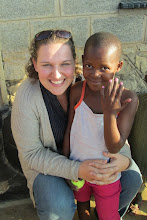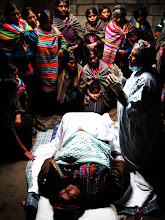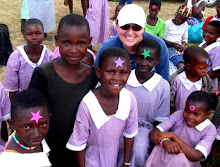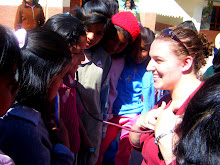One of the first things I learned as a graduate student in Medical Anthropology, is that people, in every culture, find ways to negotiate a complex web of gendered expectations, familial relationships, religious beliefs, physical needs, and medical systems. We let our families label us as "Republican" or "Feminist," even when we don't self-identify as such. We go to an acupuncturist because our best friend insists that it "worked miracles" for her. We go to see that new movie whose message we morally disagree with. We eat a burger even though we object to the meat industry, stop by for fast food on the way home from work even though it's "ruining the country," and buy cheap Walmart shoes that are made by starving children in some unidentified developing country.
Everyone draws a line in the sand somewhere. We make allowances for some things, but not others. We make decisions that sometimes fly in the face of our "soap box" values. This fact of human nature is evidence that our actions are never simple "black and white" decisions. Rather they are complicated attempts to negotiate a complex web of culture, expectations, financial constraints, and relationships.
Despite knowing this about people and culture, its sometimes difficult to acknowledge and forgive the same "grey areas" in people of a different culture. Its easier to judge, label, and stereotype. To resort to anger and frustration, rather than compassion, humility, and an open-mind. And nobody knows that more than me...
I pride myself on being a relatively well-educated, and open-minded person. I place a huge portion of my self worth on the assumption that I genuinely try to care about and love other human beings, no matter their culture, race, or religion. You could almost say that that's MY religion. However, I will be the first to admit that it isn't always easy, especially when you have as many "soap box" values as I do and you live in a culture drastically different from your own. On a day to day basis, my being "open-minded" means trying to understand the Basotho man who beats his wife or propositions me for sex while calling me a "lekhooa" (white person). It means not blindly judging the woman next door who beats her screaming toddler with a stick, the teenage girl who tries to elope with a herdboy at the age of 13, or my Ntate (host father) who is a polygamist with two wives. Its hard. Really hard. Because there are just some situations that look pretty darn "black and white" from where I'm sitting. Unfortunately, things are almost never that simple... And that's why living in Lesotho has been an everyday lesson in humility and empathy for me.
When you really get to know people, you start to realize that no one is wholly good or evil. Everyone in the world has been through something that has made them who they are.
For example, I consistently struggle to understand my fellow teachers. I should start by stating that these Basotho men and women are my colleagues and friends. They welcomed and embraced me with open arms and undying patience when I was new. I LOVE coming to school and working with them everyday. Compared to some of my fellow PCVs, I consider myself incredibly lucky that I work in a place where the staff works as a team and enjoys being together. Our staff-room at Linokong High School is constantly full of laughter, music, hilarious antics, and inside jokes. They are amazing people. But when I first moved to Lesotho, I was somewhat less convinced of their positive character and uplifting personalities.
During my first few months as a teacher in Lesotho, I watched with sadness, and sometimes even horror, as my teachers beat children instead of talking to them. I saw them come to school late, leave early, and carelessly miss classes in between. I heard male teachers refer to female students and teachers as "good breeding horses," "hopelessly lazy," "unqualified," and "useless to the school" (when speaking about a pregnant woman.) I was personally harassed about my love life, told I looked "sexy" in blue jeans, and asked if I'd be willing to engage in extra-marital affairs. It would have been so easy to label them as ignorant, backwards, and uneducated.
Time, however, has shown me a different truth. The longer I live here, the more I realize that judging and presuming to understand people based the surface of their actions is naïve, unjust, and quite frankly, it's a luxury I can't afford as a Peace Corps Volunteer. The teacher who once told me that "bo-Me (women) are just lazy" is actually one of the most loved by students. He gives every single student in his classes a unique nick-name, based on their personality. He knows every one of them by name, and when they don't come to school, he notices. I've watched him pull aside troubled kids to ask if everything is alright at home. The kids trust him, and his commitment to their well-being is palpable. He has two little girls, and he tells me he hates sending them away to boarding schools but he wants them to be able to do great things with their lives.
Another of my colleagues was once a source of relentless "harassment" (by American standards) for me. I almost wrote him off as an entirely disrespectful and ignorant misogynist... But every afternoon I watch him select the poorest malnourished orphans in the school to give his extra lunch food to. Another colleague once told a female student that if she worked hard in school he'd marry her. He's already married. The moment she blushed and ran away to tell her friends about her "teenage crush come true" he and other colleagues laughed at her expense. And you know what... He's probably one of my closest Basotho friends now, and he is a truly dedicated teacher. He leads after-school clubs, student activities, and spends weekends working with HIV+ youth.
I don't always understand or agree with the actions and beliefs of my Basotho colleagues, host family, and friends, but I can't have a successful Peace Corps service from atop my "soap box." Living with humility means accepting that I don't understand everything that goes on here. I simply can't. I don't have to agree or be happy with all their actions, but it's not my place to judge a culture and belief system that I can't fully understand. People aren't simple stereotypes, and it's a rare day that I catch a glimpse of the whole story. So I have to live every day with the assumption that people are more than what they show me.
And you know what... My life in Lesotho is a lot more wonderful and fulfilling when I give people the benefit of the doubt.
With Love from Lesotho... -Mary Elizabeth






No comments:
Post a Comment